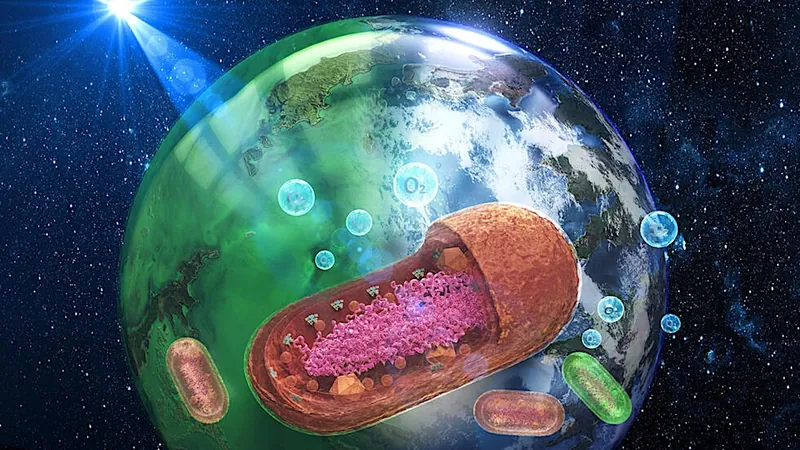
Unlocking the Secrets of Synthetic Biology: Our Path to Habitable Mars!
2025-04-01
Author: Wei
As the excitement around the prospect of colonizing Mars intensifies, synthetic biology is emerging as a leading force in making this dream a reality. This groundbreaking field combines genetic engineering and cutting-edge biotechnology to create and modify organisms with specific features. From the development of nutrient-rich golden rice to the achievements of the Human Genome Project, synthetic biology is being hailed as the future of innovation in science.
But how does this relate to Mars? One striking possibility is using engineered microbes to transform the Martian environment into one that could support human life.
Thanks to advancements such as the Nobel Prize-winning CRISPR-Cas9 technology, gene editing has become cheaper, more precise, and accessible—even in space. For instance, NASA astronaut Kate Rubins famously used the handheld MinION device aboard the International Space Station to sequence the genomes of microorganisms, demonstrating the potential of conducting genomic research beyond Earth.
Researchers are now exploring ways to leverage synthetic biology for space travel and colonization. Here’s how engineered microorganisms could help us thrive on Mars:
1. Battling Martian Radiation:
The surface of Mars is bombarded by harmful cosmic rays, posing a significant threat to human health. Fortunately, extremophiles—microbes that thrive in extreme conditions—already exist on Earth. For example, Thermus aquaticus thrives in high temperatures, while tardigrades can endure radiation and vacuum. By harnessing the genetic makeup of these resilient organisms, scientists aim to engineer microbes that could process harmful radiation and deliver protection for future Martian habitats.
2. Transforming the Atmosphere:
The thin atmosphere of Mars, primarily composed of carbon dioxide, presents a challenge for human habitation. Earth’s ancient cyanobacteria transformed our planet’s atmosphere and enriched it with oxygen—a feat that could potentially be replicated on Mars. With synthetic biology, scientists are looking to design organisms capable of thriving in Martian conditions, producing oxygen and possibly nitrogen as byproducts to create a more breathable atmosphere.
3. Accelerating Terraforming:
While traditional terraforming concepts involve long timescales to modify a planet’s climate, synthetic biology could expedite this transformation. By designing microbes that assist in regulating greenhouse gases and removing toxins, we could more rapidly create a sustainable ecosystem on Mars. This approach draws on lessons learned from Earth's history, where microbes played a foundational role in making our planet habitable.
4. Pioneering New Life on Mars:
As we prepare to introduce new life forms to Mars, ethical considerations loom large. The implications of spreading engineered life on another planet raise complex questions. Yet, as we forge ahead into the cosmos, synthetic biology presents our best hope for expanding human presence beyond Earth. According to research from Macquarie University, developing multi-biofortified crops with enhanced nutritional and storage qualities could revolutionize food production on Mars, ensuring our survival as we explore the red planet.
The future of interplanetary life not only relies on our technological advancements but also on our philosophical willingness to embrace synthetic life forms. As research in synthetic biology continues to unfold, the possibilities seem endless. With the right genes in place, we just might become an interplanetary species sooner than we ever imagined!
Stay tuned as we explore these intriguing frontiers of science, where every breakthrough brings us one step closer to making Mars our second home!


 Brasil (PT)
Brasil (PT)
 Canada (EN)
Canada (EN)
 Chile (ES)
Chile (ES)
 Česko (CS)
Česko (CS)
 대한민국 (KO)
대한민국 (KO)
 España (ES)
España (ES)
 France (FR)
France (FR)
 Hong Kong (EN)
Hong Kong (EN)
 Italia (IT)
Italia (IT)
 日本 (JA)
日本 (JA)
 Magyarország (HU)
Magyarország (HU)
 Norge (NO)
Norge (NO)
 Polska (PL)
Polska (PL)
 Schweiz (DE)
Schweiz (DE)
 Singapore (EN)
Singapore (EN)
 Sverige (SV)
Sverige (SV)
 Suomi (FI)
Suomi (FI)
 Türkiye (TR)
Türkiye (TR)
 الإمارات العربية المتحدة (AR)
الإمارات العربية المتحدة (AR)